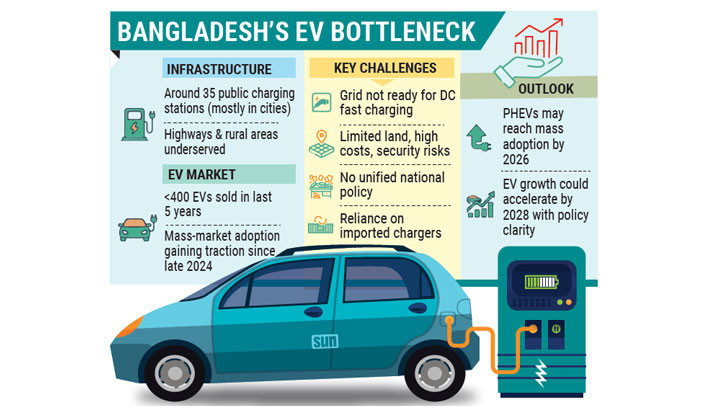EV sector rises, charging network lags behind
Experts warn that the current infrastructure is inadequate for widespread EV adoption
Shahrier Hossen Mahi, Dhaka
Published: 14 Nov 2025

Bangladesh’s electric vehicle (EV) sector is steadily expanding, yet the development of essential charging infrastructure is falling well behind.
Industry officials and energy experts caution that a shortage of public charging stations, an unstable electricity supply, and ambiguous government policies are hindering Bangladesh’s shift toward cleaner transportation.
At present, approximately 35 public EV charging stations operate across the country, primarily in major cities, leaving highways and rural areas largely underserved.
This scarcity of charging stations is fuelling rising “range anxiety” among EV owners, complicating long-distance travel and reducing the attractiveness of EVs for daily commuting.
Imran Hossain, deputy manager (corporate sales) at BYD Bangladesh, said the local EV market is still in its early stages compared to other countries.
“The number of EVs in Bangladesh remains small,” he noted.
He said BYD offers home chargers and portable charging cables to provide customers with greater flexibility and estimates that 33 to 35 charging stations are currently operational.
He hopes that by next year, every one of Bangladesh’s 64 districts will have at least one charging station – a milestone that would represent a significant leap forward.
Experts warn that the current infrastructure is inadequate for widespread EV adoption.
They cautioned that Bangladesh’s national grid is not yet equipped to support high-capacity DC fast charging, a crucial requirement for long-distance EV travel.
Besides, private investors face slow returns due to the limited number of EVs, while inconsistent regulations make long-term planning difficult.
Multiple government agencies, including SREDA, BERC, the Power Division, and the Road Transport Division, play roles in the EV ecosystem, yet a unified national policy has yet to be established.
Shoeb Ahmed, divisional director of DHS Autos Limited, said securing suitable land for charging stations in high-traffic areas remains a significant hurdle.
“Land prices are steep, and many potential sites do not have the power capacity required to support DC fast chargers,” he added.
“Establishing substations demands substantial investment and lengthy approval processes. While DC chargers are expensive, they are essential for public charging networks,” he said.
“Security is also a major concern, as highway charging sites are vulnerable to theft and vandalism. Deepal currently operates 22 charging stations nationwide and has plans for further expansion,” said Shoeb Ahmed.
EV adoption in Bangladesh remains sluggish. Of nearly 30,000 new vehicles sold over the past five years, fewer than 400 were electric, primarily in the luxury segment.
Industry insiders believe that with the government’s new EV duty structure, growth could accelerate by 2028, while plug-in hybrid vehicles (PHEVs) may see broader adoption as early as next year.
SREDA’s 2024 guidelines recommend incorporating solar and hybrid energy solutions into charging stations to ease the burden on the national grid, especially in remote areas.
Research is also underway on battery-swapping models for two- and three-wheelers, though widespread adoption will require standardisation of batteries and supply chains.
Despite these challenges, companies like BYD and Deepal remain optimistic, confident that as more charging stations are established and customer trust grows, Bangladesh’s EV sector will gain significant momentum.
Experts also stress the importance of standardising charging plugs, payment systems, and data communication across all networks.
They noted that limited local manufacturing keeps Bangladesh reliant on imports, slowing installations and raising costs, and stressed that coordinated government support, financial incentives, and local production are vital for a sustainable nationwide charging network.
Conversely, they warned, land shortages in major cities further hinder expansion, while many two- and three-wheeler owners rely on informal charging points, posing safety risks.
The reporter can be reached at [email protected]
Edited by Mehedi Hasan

